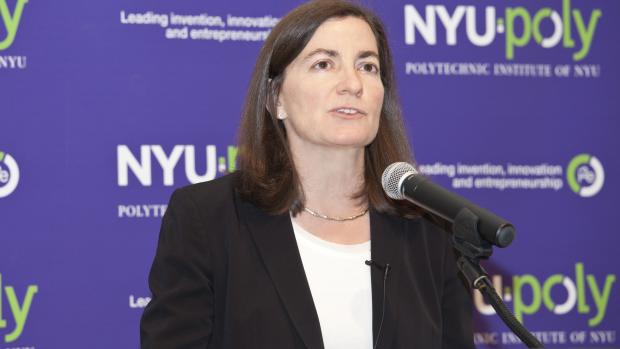FTC Commissioner Brill Warns About Cyberspace Big Data Abuse
Third NYU-Poly Sloan Foundation Cyber Security Lecture

Federal Trade Commissioner Julie Brill has a big job with big implications for businesses and consumers alike. Her mission—to ensure that the U.S. economy operates with vigorous competition among producers, yet gives consumers access to accurate information--now even more vital in an era of Big Data.
Addressing the audience at the Polytechnic Institute of New York University (NYU-Poly) Third Sloan Foundation Cyber Security Lecture, held on October 23 in the Pfizer Auditorium, Brill explained that ubiquitous sites, like Facebook, WebMD, Twitter, and Foursquare, yield massive amounts of data about users, which may then be “mined” by data brokers who then sell personal information for potential troubling uses--employment and tenant screening, criminal background checks, and other activities that may expose consumers to unfair practices.
Brill cautioned, “Most of us have been loath to examine too closely the price we pay by forfeiting control of our personal data in exchange for the convenience, ease of communication, and fun in a free-ranging and mostly free cyberspace.”
In response, Brill has launched what she calls, “Reclaim Your Name,” an approach that would give consumers the knowledge and tools to reassert some control over personal data: to decide how much to share, with whom, and for what purpose.
“And you -- the engineers, computer scientists, and technologists -- you can help industry develop this robust system for consumers,” she asserted. “This is your ‘call to arms’--or perhaps, given who you are, your ‘call to keyboard’ -- to help create technological solutions to some of the most vexing privacy problems presented by big data.”
Following her address, Brill took part in a lively panel discussion, moderated by NYU Professor of Law Katherine Strandburg. They were joined by Jennifer Barrett Glasgow of Acxiom, a major data-brokerage company; Julia Angwin, who reports on technology for The Wall Street Journal; and Daniel Weitzner, director of MIT's CSAIL Decentralized Information Group and former White House Internet czar. Despite varying points of view, they all conceded that building a system that respects consumer privacy and engenders trust, while also allowing Big Data to reach its full potential, requires a partnership among legislators, technologists, and consumers. “On that point, we are in violent agreement,” Brill quipped.
The lecture and discussion drew faculty, students, and industry professionals. Marianne Bunton, a digital marketing student at NYU’s School of Continuing and Professional Studies, echoed the sentiment of many when she said, “Big Data is changing my field so quickly and to such an extent that it’s sometimes hard to keep up, but events like this help a great deal. I’m especially excited to have the opportunity to hear the Federal Trade Commissioner speak at Poly.” Brill's talk and subsequent panel discussion was streamed live and is available online. Previous Poly Sloan Cyber Security lectures may be viewed here.
Running After Taxi Big Data
“New Yorkers take about 500,000 taxi trips a day,” reported NYU-Poly Professor Juliana Freire in a luncheon address. “If you have an easy-to-use way like this to analyze all that data, those taxis can act as sensors, giving us a picture of the city’s economic activity, human behaviors, and mobility patterns.” Professor Freire's demonstrated potential Big Data payoffs, using visualization techniques her lab is exploiting. Her technical talk followed the morning's panel discussion on social implications of Big Data. Afterwards, NYU-Poly Computer Science Department Head Professor Nasir Memon, who chairs the Poly/Sloan Lecture Series, presented Brill with a Distinguished Lecturer Award. Professor Freire's presentation, "Big Data: What Is the Big Deal?" elicited some chuckles, which turned to murmurs of recognition when the city's traffic patterns were shown in video clips from TaxiVis, a system she helped develop to analyze New York City taxi data collected over three years. Professor Freire holds a cross appointment with the Courant Institute and is also a member of NYU’s Center of Data Science.




